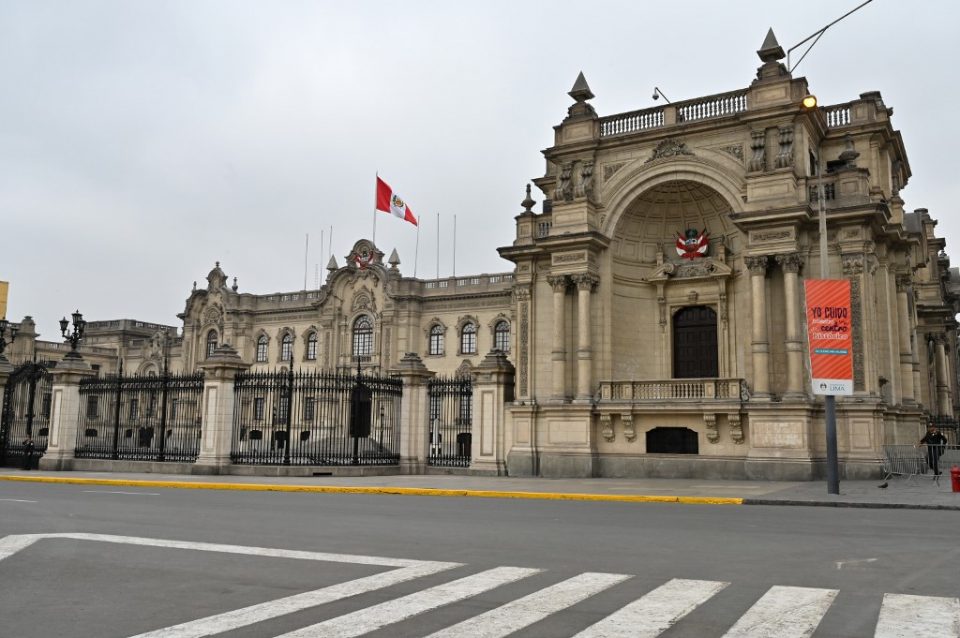
by Francisco JARA
LIMA, Peru (AFP) — Peru’s President Martin Vizcarra consolidated power Tuesday in a tense stand-off with the opposition over corruption, confirming the backing of the armed forces, police and the international community after dissolving Congress.
Opposition lawmakers accused Vizcarra of mounting a “coup d’etat,” voting to suspend him temporarily from the presidency and appointing Vice President Mercedes Araoz as leader in what appeared to be a token gesture of defiance.
Thousands of people poured into the streets of Lima and other major cities in a show of support for Vizcarra hours after he announced the shut-down late Monday.
Crucially, the heads of Peru’s armed forces and police reaffirmed their allegiance to the president, as did around a dozen regional governors who joined celebratory street protests.
In a televised address late Monday, Vizcarra announced he was dissolving the opposition-dominated Congress after it blocked a raft of anti-corruption reforms, including changes to the way judges are appointed to the Supreme Court.
“There’s too much corruption. Too much of it without any shame. It’s high time this happened, that there’s a change,” said protester Jenny Sanchez in Lima, as demonstrators waved flags saying “New Peru.”
Araoz made no public appearances after her appointment, but held meetings with opposition leaders in her home, and vowed not to shirk the demands of her new position “no matter how difficult the circumstances may be.”
Despite the heated stand-off, Peru went about its business as usual on Tuesday, with the only noticeable change being heightened security around the government palace and Congress.
January elections
Vizcarra called new legislative elections for January 26, according to a decree published in the official gazette.
Under an electoral reform enacted last year, lawmakers cannot run for re-election. A new Congress would only have a mandate until 2021, to complete the five-year period for which the dissolved Congress was elected.
The upcoming polls will likely favor leftist parties like Nuevo Peru and Frente Amplio, which supported the dissolution, political analyst Fernando Rospigliosi told AFP.
Until the elections, legislative duties will fall to a 27-member Permanent Congressional Commission, 18 of whom are opposition lawmakers.
The commission is led by Pedro Olaechea, the Congress speaker, who accuses Vizcarra of unlawfully seizing power.
“We are facing a coup d’etat,” another opposition legislator Jorge del Castillo said of Vizcarra’s move. “I hope the armed forces and the police will stay out of this charade.”
The Catholic Church called for dialogue and urged politicians to “act according to the constitutional and democratic order.”
Vizcarra — whose anti-graft drive has won him widespread popularity — has repeatedly clashed with Congress, which is dominated by the Popular Force party of Keiko Fujimori.
Vizcarra had warned Congress on Sunday that he would dissolve the legislative body if it denied him a vote of confidence Monday on reforming the method of appointing magistrates. The move was aimed at preventing the opposition from taking control of the Supreme Court.
The Organization of American States (OAS) backed Vizcarra’s election call: “It is fair that the political polarization in the country will be resolved by the people at the polls.”
“It is essential that the public is not exposed to violence in the context of conflict and political fragility seen in recent months,” the OAS said in a statement.
Stand-off
Peru’s grinding political stand-off has its roots in the 2016 presidential election, when banker Pedro Pablo Kuczynski beat Fujimori.
Although she lost her bid for the presidency, her party won an overwhelming majority in Congress, eventually forcing Kuczynski’s resignation last year amid a corruption scandal.
Kuczynski was replaced by Vizcarra, then first vice president, who has vowed to clean up Peruvian politics, which has long been embroiled in a multi-million dollar corruption scandal.
Fujimori is the eldest daughter of disgraced former president Alberto Fujimori and is herself in prison awaiting trial after being accused of accepting $1.2 million in illicit party funding from Brazilian construction giant Odebrecht for her 2011 presidential campaign.
The Supreme Court is currently debating whether to free Keiko Fujimori — once Peru’s most popular politician — from pre-trial detention.
Odebrecht has admitted paying at least $29 million in bribes to Peruvian officials since 2004.
Three former presidents, including Kuczynski, are also being investigated over Odebrecht, while a fourth, Alan Garcia, committed suicide in April after police arrived at his house to arrest him for money laundering.
© Agence France-Presse
